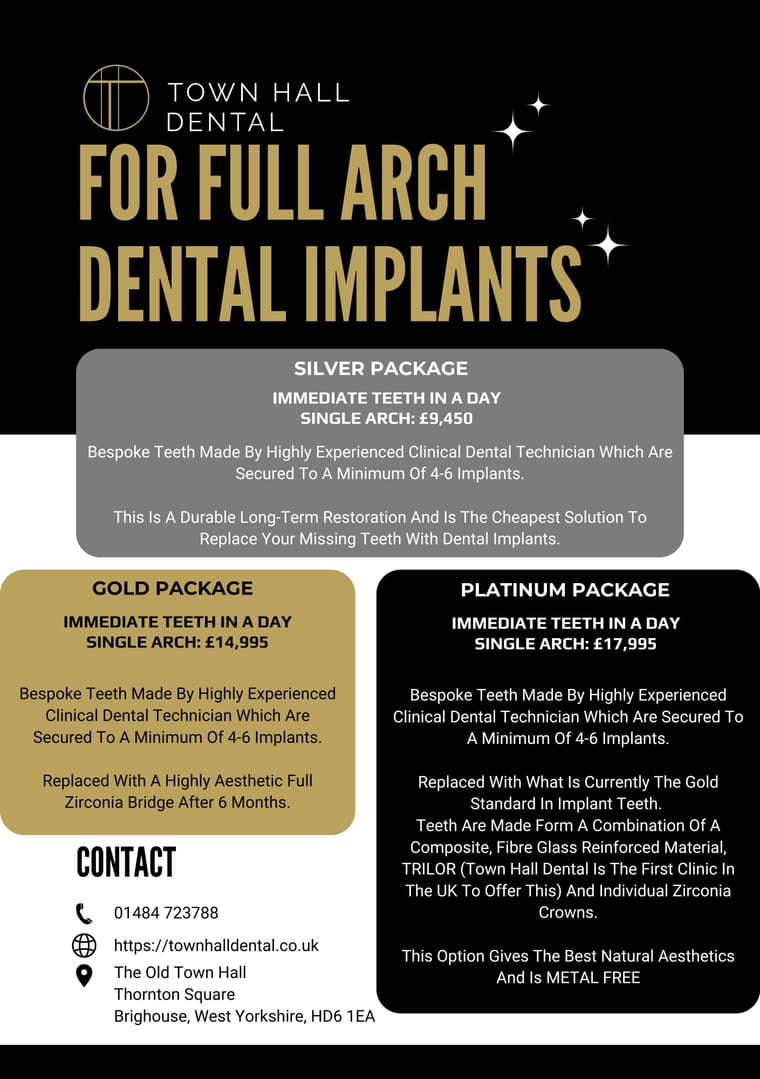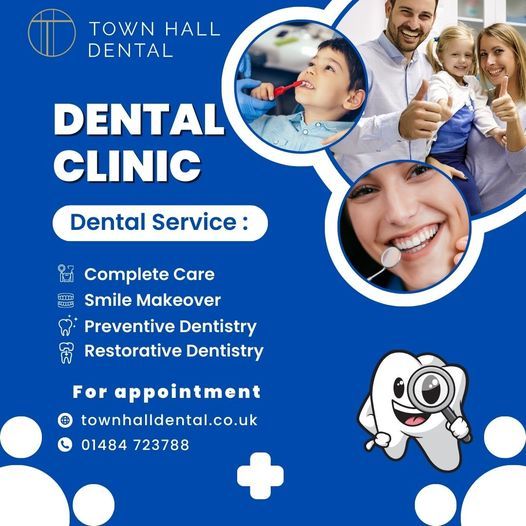Discover comprehensive dental implant services in the UK. Our expert team offers advanced treatments for a confident smile. Book your consultation today and transform your dental health.
Townhalldental
Posts
-
Town Hall Dental: Best Dental Implant in brighouse -
Can a Tongue Tie Affect Speech Development? A baby’s first cry, a toddler’s babble, a child’s clear articulation – these milestones mark the fascinating journey of speech development. But what happens when a seemingly small anatomical variation, a tongue tie, interferes with this process? At Town Hall Dental, we understand the concerns parents have about their children’s speech. This article explores the potential impact of tongue tie on speech development. We’ll delve into its causes, symptoms, and the crucial role early intervention plays.
A baby’s first cry, a toddler’s babble, a child’s clear articulation – these milestones mark the fascinating journey of speech development. But what happens when a seemingly small anatomical variation, a tongue tie, interferes with this process? At Town Hall Dental, we understand the concerns parents have about their children’s speech. This article explores the potential impact of tongue tie on speech development. We’ll delve into its causes, symptoms, and the crucial role early intervention plays.Understanding Tongue Tie and Its Mechanics
A tongue tie, medically known as ankyloglossia, occurs when the lingual frenulum – the thin tissue connecting the underside of the tongue to the floor of the mouth – is unusually short, thick, or tight. This restriction can limit the tongue’s range of motion. The severity of a tongue tie varies. In some cases, it may be barely noticeable. In others, it can significantly hinder tongue movement. The tongue is vital for various oral functions. These include breastfeeding, swallowing, and, crucially, speech articulation. When the tongue’s mobility is compromised, it can lead to difficulties in producing certain sounds. Understanding the mechanics of a tongue tie is the first step towards addressing its potential impact.
The Potential Impact of Tongue Tie on Speech Articulation
Speech articulation relies on precise tongue movements. Specific sounds require the tongue to reach certain positions within the mouth. For example, the “th,” “l,” “r,” “s,” and “z” sounds often require significant tongue elevation. A restricted frenulum can make these movements challenging. Children with a significant tongue tie may struggle to produce these sounds accurately. This can lead to speech delays or distortions. They may substitute one sound for another. Or they may omit sounds altogether. This can result in speech that is difficult to understand. The degree of speech impairment depends on the severity of the tongue tie. It also depends on the child’s individual compensation strategies. Early identification and intervention are crucial. This helps minimise the potential impact on speech development. Town Hall Dental can help you identify if a tongue tie is a problem.
Recognising the Signs and Symptoms of Tongue Tie
Identifying a tongue tie early is vital. Parents should look for certain signs and symptoms. In infants, difficulty latching onto the breast during feeding can be an early indicator. This can result in poor weight gain or maternal nipple pain. As children grow, other signs may emerge. These include difficulty sticking out the tongue past the lower lip. Or a heart-shaped appearance of the tongue when it is extended. Speech difficulties, as mentioned earlier, can also be a significant symptom. Parents may notice their child struggling with specific sounds. Or their child’s speech may be generally unclear. A thorough oral examination by a dental professional or paediatrician is necessary for accurate diagnosis. Town Hall Dental can provide this examination. It is important to remember that not all children with a tongue tie will experience speech problems. However, if concerns arise, it’s best to seek professional advice.
Intervention and Treatment Options for Tongue Tie
If a tongue tie is diagnosed and deemed to be affecting speech development, various intervention options are available. In some cases, a simple frenotomy may be recommended. This involves a small cut to release the restrictive frenulum. It is a quick and relatively painless procedure. It can often be performed in a dental or medical office. In more complex cases, a frenuloplasty may be necessary. This involves a more extensive surgical revision of the frenulum. Speech therapy can also play a crucial role. This is done in conjunction with or following a surgical procedure. Speech therapy helps children learn to use their newly freed tongue to produce correct sounds. Early intervention is key to maximising the benefits of treatment. The earlier a tongue tie is addressed, the less likely it is to cause long-term speech difficulties. Town Hall Dental can advise you on the best course of action.
The Importance of Early Intervention and Multidisciplinary Care
Early intervention is paramount in addressing the potential impact of tongue tie on speech development. Children who receive timely treatment are more likely to achieve typical speech patterns. A multidisciplinary approach is often beneficial. This involves collaboration between dental professionals, paediatricians, speech therapists, and other specialists. A team approach ensures comprehensive care. It addresses all aspects of the child’s development. This includes oral function and speech. Parents play a vital role in this process. They should be vigilant in observing their child’s development. They should also seek professional advice when concerns arise. Town Hall Dental is committed to providing comprehensive care. We can help guide parents through this process. We understand the importance of addressing tongue tie early.
Long-Term Effects and Considerations
While many children experience significant improvement after treatment, some may continue to have residual speech difficulties. This can be due to various factors. These include the severity of the initial tongue tie. It can also be due to the child’s individual learning style. Ongoing speech therapy may be necessary to address these challenges. It is essential to maintain open communication with healthcare providers. This ensures the child receives the necessary support. Regular follow-up appointments are crucial. These appointments monitor progress and address any emerging concerns. Parents should also be aware that a tongue tie can sometimes affect other aspects of oral function. These include swallowing and oral hygiene. Therefore, a holistic approach to care is essential. Town Hall Dental can help you to understand the long term effects of a tongue tie.
Conclusion
A tongue tie can indeed affect speech development. The degree of impact varies. Early identification and intervention are crucial. Parents should be vigilant in observing their child’s development. They should seek professional advice when concerns arise. Treatment options, such as frenotomy or frenuloplasty, along with speech therapy, can significantly improve speech articulation. A multidisciplinary approach ensures comprehensive care. At Town Hall Dental, we are dedicated to providing expert care. We understand the importance of addressing tongue tie early. We aim to support children and their families throughout the process. We believe that every child deserves the opportunity to develop clear and confident communication skills.
Have you or your child experienced challenges related to tongue tie? Share your experiences and questions in the comments below. -
Town Hall Dental: Best Dentist in brighouseExplore Tongue Tie Treatment at Town Hall Dental. Expert care for tongue tie issues. Learn more about our specialized treatment options and regain oral health and function today
https://youtu.be/_y2Kh_zTgp0 -
Town Hall Dental: Best Tongue Tie in BrighouseVisit Town Hall Dental for expert treatment of tongue tie. Our experienced team provides gentle care to resolve tongue tie issues efficiently. Book your appointment today for comprehensive care

-
Town Hall Dental: Best Dentist in BrighouseVisit Town Hall Dental for expert denture care services. Our Denture Care Center offers tailored solutions for your needs. Improve your smile today with our professional care
https://townhalldental.co.uk/treatments/dentures/https://drive.google.com/file/d/1wGX2cwYgU5Ggh2k_UlUlkCnlOYH-1qEB/view?usp=sharing
